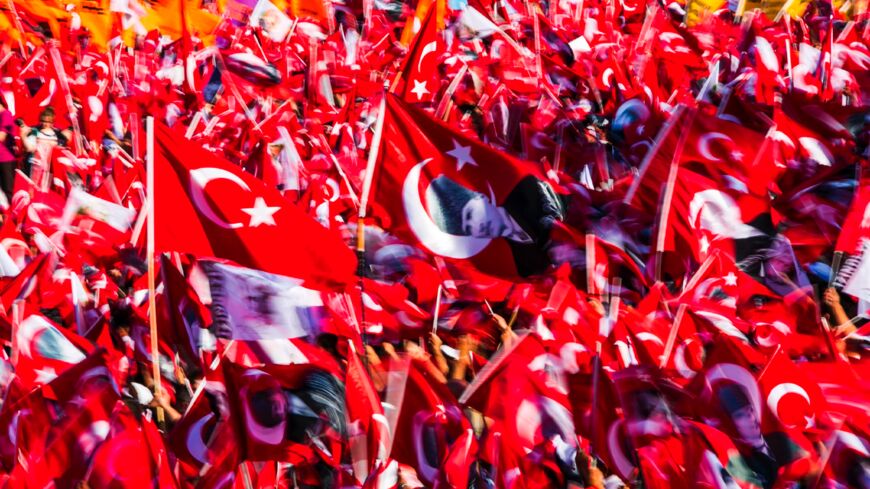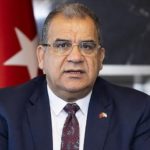A Turkish court has slapped a ban on all coverage of a young medical student who took his life because he could no longer cope with the pressures of his religious family and the powerful Islamic Nur fraternity they had forced him to join.
The ban followed a formal petition lodged by Enes Kara’s father, Mehmet Kara, on the grounds that his family’s grief was being compounded by the media that infringed on its privacy.
Kara, 19, was laid to rest last week in his native Hatay province bordering Syria. However, the debate swirling around his tragic end continues apace, exposing the deep fractures between pious and secular Turks amid angry calls from the latter to shutter schools and dormitories run by the religious orders known as the “tarikats” and brotherhoods known as the “cemaat.”
Kara made national headlines after sharing a video he had recorded on Dec. 5, 2021, before his death on Jan. 10 in which he explained why he was resorting to suicide. In a low, faltering and listless voice, Kara described his helplessness in the face of his daily grind at medical school followed by evenings at lodgings run by the Nur tarikat.
He was forced to rise at 6:30 a.m. to perform morning prayers before going to class, to read religious texts for long hours and then to pray before bedtime despite being an atheist for the past three years. Kara didn’t want to become a doctor and dreamt of going abroad. “I might have become an engineer,” he mused. But his father, a hardcore follower of the Nur cemaat, paid no heed and said he must obey the cemaat’s orders. “I don’t feel free; the time I can set aside for myself is at most three hours. I am tired. I have no hope,” he said, adding that he knew many young people shared such feelings.
The video unleashed an outpouring of grief and anger but above all polarizing rhetoric over the role of Islam, which has grown markedly pronounced since Turkish President Recep Tayyip Erdogan and his Justice and Development Party (AKP) were voted into office in 2002.
“The cemaat schools and dormitories are the parasites of this country’s education system. They draw the best and the brightest children from society much as a mosquito draws blood then either indoctrinates them or forces them into role-playing, into submission and to giving up on life. My biggest desire is for all of them to be shut down,” tweeted Gokce Sencan, a San Francisco-based environmentalist who, as a brilliant teenage student, had been offered and then rejected a lucrative scholarship by an Islamic fraternity.
Ali Erkan Kavakli, a columnist for Akit, an overtly Islamist government mouthpiece, opined that Kara’s suicide amounted to a confession that “an atheist had chosen the wrong path.”
The debate over the place of Islam in public life remains among the most contentious in Turkey despite the easing of bans on Islamic head coverings for women, which became its most potent symbol.
When Kemal Ataturk erected today’s increasingly beleaguered secular republic from the ruins of the Ottoman Empire in 1923, he shut down all Islamic fraternities, saying they were reactionary influences holding back Turkey from the modern age. Pacifist Sufi orders and Alevi and Bektashi lodges fell under his wide-swinging ax, causing trauma “from which Turkish society has yet to fully recover,” said Ali Aktas, a member of the pro-Islamic opposition Saadet Party. However, many continued to operate underground and have since emerged from the shadows with politicians courting their votes and dispensing patronage in return, just as the military continued to crack down on them, purging alleged Islamists from its ranks and overthrowing Turkey’s first Islamist-led government in 1998 in a bloodless “post-modern” coup.
“Calls for shutting down all the cemaats and tarikats revives the trauma and hardens the conviction among conservative voters that the opposition cannot be trusted to respect their way of life,” Aktas told Al-Monitor. The demonizing language used by some secularists “has played straight into Erdogan’s hands,” said Ruveyda Celenk, a psychologist and commentator.
This may explain in part why Kemal Kilicdaroglu, the leader of the main opposition Republican People’s Party that was founded by Ataturk, did not react to the news of Kara’s death, probably out of fear of alienating religious voters he is hoping to draw ahead of presidential and parliamentary elections that are scheduled to be held in 2023. Faced with a barrage of criticism, he claimed that he had not done so for “ethical” reasons.
Erdogan has not uttered a word either.
Erdogan’s rise to power saw the military shorn of its previous power and strictures on overt piety removed, with critics accusing him of using religion to mask massive corruption, polarize society and shore up his base.
Several privately run Islamic educational foundations have been enmeshed in a slew of scandals ranging from corruption and sexual abuse of minors to the Islamic State-style beheading in December of an 18-year-old student who was residing in a dormitory run by a group that is closely linked to followers of Aziz Hudayi Mahmut, an Ottoman-era Sufi mystic and scholar. A chef working at the dorm’s canteen sliced off the boy’s head with a meat cleaver and placed it on his chest, crowing, “I struck the Deccal.” He was alluding to the “fake messiah” in Islamic eschatology. His motives remain unknown.
Turkey’s richest and once omnipotent fraternity headed by Fethullah Gulen, a Sunni cleric living in Pennsylvania who is on Turkey’s list of most-wanted terrorists, has probably done more than any to burnish and then tarnish the image of Islamic brotherhoods. Its moderate messaging, with calls for close relations with the West, including Israel, and high-achieving schools, made the Gulen fraternity the darling of the liberal intelligentsia in the early days of AKP rule. It was commonly held that with Gulen as his chief ally, Erdogan was carrying Turkey along the path to democracy where Turks of all creeds and ethnicities could live together happily ever after.
Gulen’s alleged masterminding of the failed coup against Erdogan in 2016, however, brought a definitive end to the starry-eyed projections and resulted in the imprisonment of hundreds of thousands of his followers. Allegations of the cult-like devotion exercised by his disciples including revering his used underwear and nail clippings began to surface in the pro-government media.
Aktas said he had pulled his son from a dormitory run by a religious brotherhood five years ago after the child complained about pressure from its members. “They were trying to indoctrinate him against his will,” Aktas said. “What is needed is better vetting of the establishments, not banning them and driving them underground again,” he added.
The government has come under increasing fire over the lack of affordable student housing, which forces lower-income youths into the arms of Islamic fraternities who offer free lodgings but with strings attached, as recounted by Kara. The close links between Erdogan’s family and various educational foundations where some of the abuses occurred have added to the controversy. And it didn’t help when the deputy minister of education was replaced this week by Nazif Yilmaz, the man who ran Erdogan’s “raising a pious generation” project within the ministry.
According to Turkish media reports, when Yilmaz was appointed head of the religious education department, there were only 1,036 Islamic clerical-training middle schools. There are currently some 3,427 of them. Yet despite Erdogan’s best efforts, religious schools are delivering fewer successful university candidates and have waning appeal among Turkish youth. According to recent polls, piety is diminishing in the younger generation raised under 19 years of Erdogan’s rule. A growing number, like Kara, are rejecting Islam altogether.
According to a survey conducted in October by Ankara-based polling outfit MetroPOLL, 81.5% of respondents said they would “never” send their children to dormitories run by religious orders.
Some 73.9 of the respondents who said they had voted for Erdogan’s party in the 2018 parliamentary elections were among them.
Amid all the punditry, the human dimension underpinning Kara’s action is getting lost, contended Celenk, the psychologist. “Enes’ feelings, like so many youths, were disregarded,” she said. “What would have behooved the opposition and the government alike would have been to say, ‘We are here for you at all times,’” Celenk said.
At the end of his suicide video, Kara says he has some money saved and that he would like his mom to buy the new stovetop oven she always wanted and that her father refused to get.
The rest he says should go to his two sisters, who are both being forced into religious education as well. Emotion creeps into his voice. “Leave them alone,” he pleads.
By: Amberin Zaman
Source: Al – Monitor



